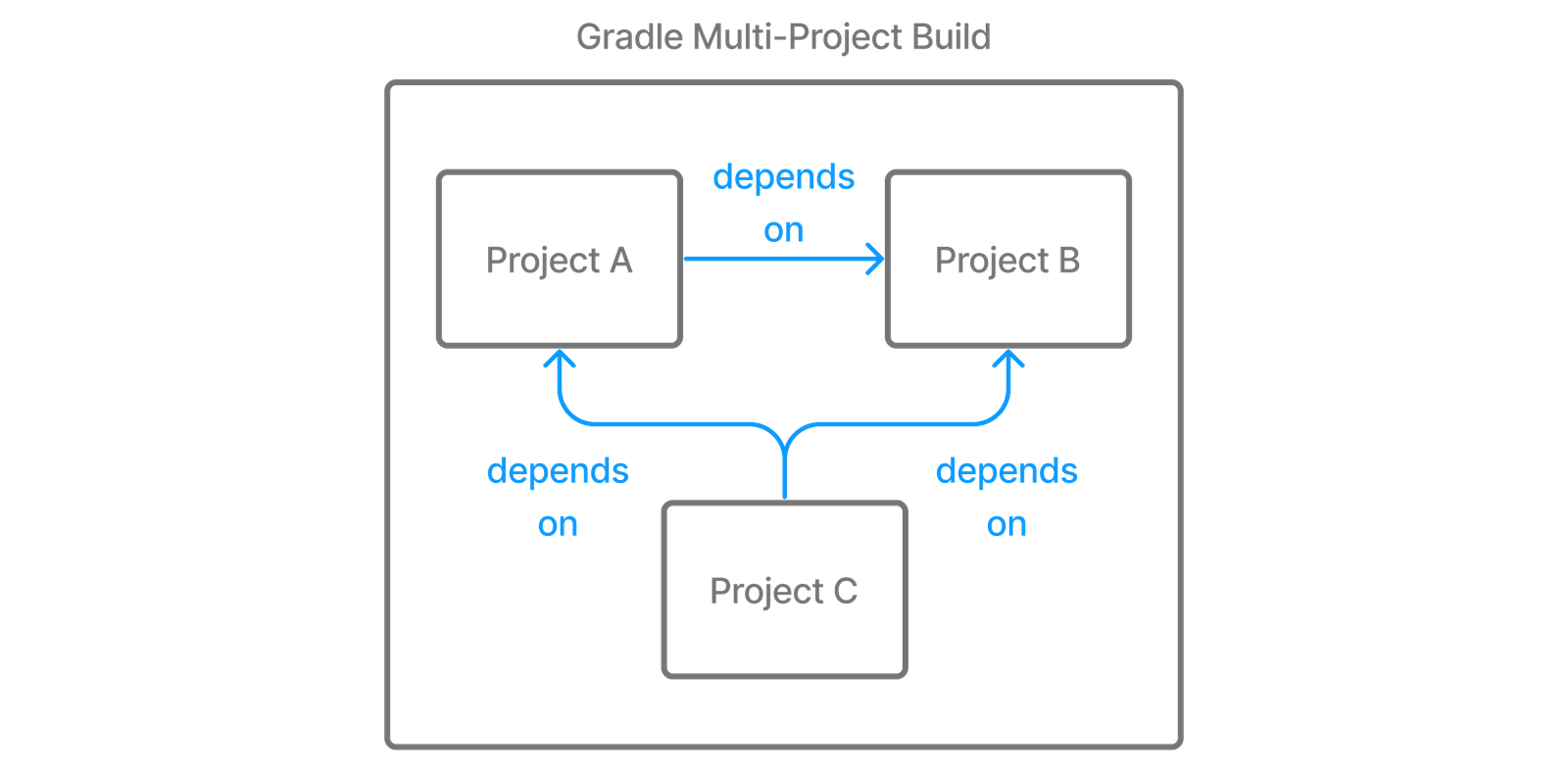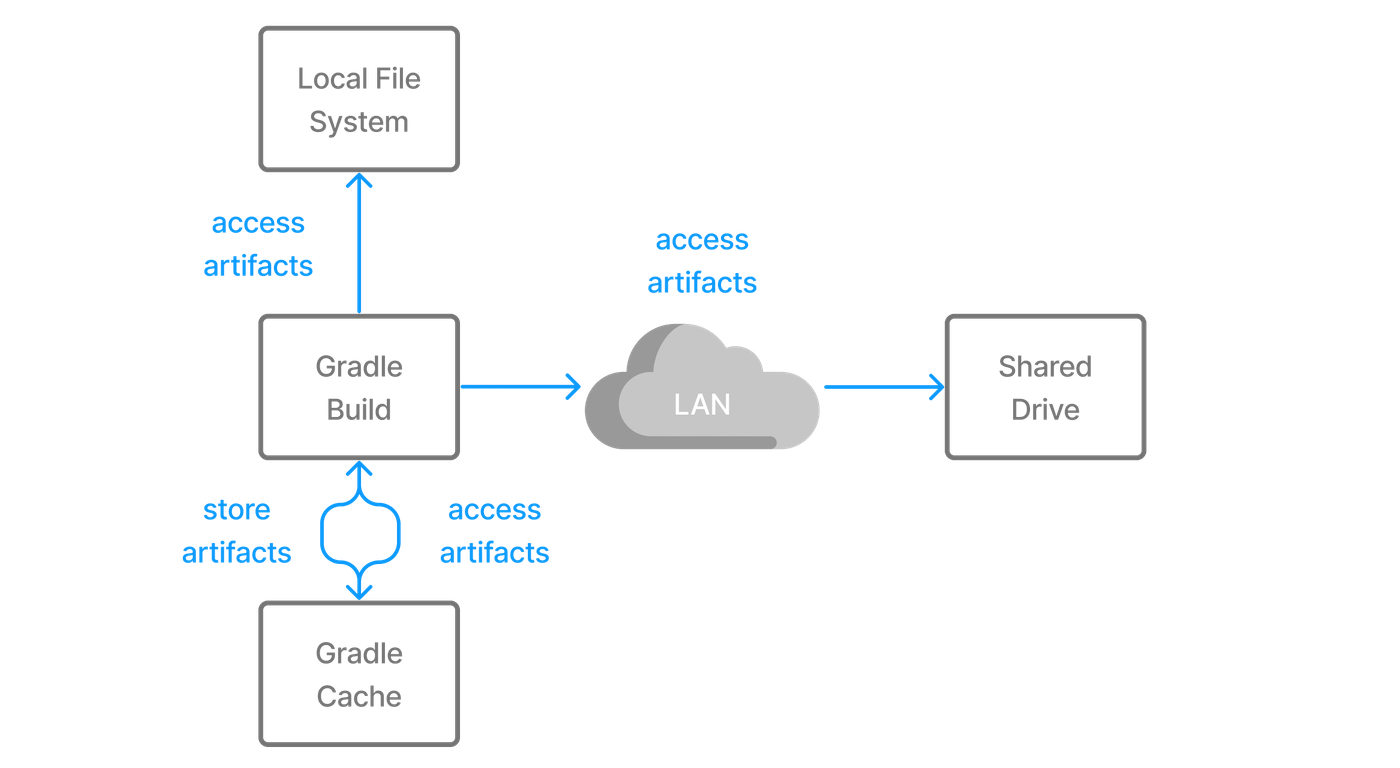相依性類型
Gradle 中有三種主要類型的相依性
-
模組相依性:參照來自外部儲存庫的函式庫。
-
專案相依性:參照在同一個多專案建置中的其他專案。
-
檔案相依性:參照本機檔案或目錄,例如
.jar或.aar檔案。
1. 模組相依性
模組相依性是最常見的相依性。它們參照由模組座標(群組、名稱和版本)識別的相依性
dependencies {
runtimeOnly(group = "org.springframework", name = "spring-core", version = "2.5")
runtimeOnly("org.springframework:spring-aop:2.5")
runtimeOnly("org.hibernate:hibernate:3.0.5") {
isTransitive = true
}
runtimeOnly(group = "org.hibernate", name = "hibernate", version = "3.0.5") {
isTransitive = true
}
}dependencies {
runtimeOnly group: 'org.springframework', name: 'spring-core', version: '2.5'
runtimeOnly 'org.springframework:spring-core:2.5',
'org.springframework:spring-aop:2.5'
runtimeOnly(
[group: 'org.springframework', name: 'spring-core', version: '2.5'],
[group: 'org.springframework', name: 'spring-aop', version: '2.5']
)
runtimeOnly('org.hibernate:hibernate:3.0.5') {
transitive = true
}
runtimeOnly group: 'org.hibernate', name: 'hibernate', version: '3.0.5', transitive: true
runtimeOnly(group: 'org.hibernate', name: 'hibernate', version: '3.0.5') {
transitive = true
}
}Gradle 提供多種表示法來宣告模組相依性,包括字串表示法和映射表示法。
-
字串表示法: 通過將群組、名稱和版本組合到單個字串中,簡化了相依性宣告。
-
映射表示法: 允許單獨指定座標的每個部分。
對於進階配置,例如強制執行嚴格版本,您也可以在這些表示法旁邊提供閉包。
2. 專案相依性
專案相依性允許您參照多專案 Gradle 建置中的其他專案。

這對於將大型專案組織成更小的模組化組件非常有用
dependencies {
implementation(project(":utils"))
implementation(project(":api"))
}dependencies {
implementation project(':utils')
implementation project(':api')
}Gradle 使用 project() 函數來定義專案相依性。此函數採用目標專案在建置中的相對路徑。路徑通常使用冒號 (:) 來分隔專案結構的不同層級。
專案相依性會自動解析,以便始終在依賴專案之前建置相關專案。
型別安全專案相依性
型別安全專案存取器是一項孵化中的功能,必須明確啟用。實作可能會隨時更改。
要添加對型別安全專案存取器的支援,請將 enableFeaturePreview("TYPESAFE_PROJECT_ACCESSORS") 添加到您的 settings.gradle(.kts) 檔案中
enableFeaturePreview("TYPESAFE_PROJECT_ACCESSORS")enableFeaturePreview 'TYPESAFE_PROJECT_ACCESSORS'使用 project(":some:path") 表示法的一個缺點是需要記住相依性的專案路徑。此外,更改專案路徑需要手動更新每個出現的地方,從而增加了遺漏的風險。
相反,實驗性的型別安全專案存取器 API 提供了 IDE 完成功能,使宣告相依性更容易
dependencies {
implementation(projects.utils)
implementation(projects.api)
}dependencies {
implementation projects.utils
implementation projects.api
}使用此 API,在 Kotlin DSL 腳本中錯誤指定的專案會觸發編譯錯誤,幫助您避免遺漏更新。
專案存取器基於專案路徑。例如,路徑 :commons:utils:some:lib 變為 projects.commons.utils.some.lib,而 kebab-case (some-lib) 和 snake-case (some_lib) 則轉換為 camel case:projects.someLib。
3. 檔案相依性
檔案相依性允許您通過參照外部 JAR 或其他檔案的路徑,將它們直接包含到您的專案中。檔案相依性還允許您將一組檔案直接添加到配置中,而無需使用儲存庫。
通常不鼓勵使用檔案相依性。相反,首選宣告外部儲存庫上的相依性,或者在必要時,使用 file:// URL 宣告 maven 或 ivy 儲存庫。 |

檔案相依性是獨特的,因為它們表示對檔案系統上檔案的直接參照,而沒有任何相關聯的 元數據,例如傳遞相依性、來源或作者資訊。
configurations {
create("antContrib")
create("externalLibs")
create("deploymentTools")
}
dependencies {
"antContrib"(files("ant/antcontrib.jar"))
"externalLibs"(files("libs/commons-lang.jar", "libs/log4j.jar"))
"deploymentTools"(fileTree("tools") { include("*.exe") })
}configurations {
antContrib
externalLibs
deploymentTools
}
dependencies {
antContrib files('ant/antcontrib.jar')
externalLibs files('libs/commons-lang.jar', 'libs/log4j.jar')
deploymentTools(fileTree('tools') { include '*.exe' })
}在此範例中,每個相依性都明確指定了其在檔案系統中的位置。參照這些檔案的常用方法包括
-
Project.files():直接接受一個或多個檔案路徑。 -
ProjectLayout.files():直接接受一個或多個檔案路徑。 -
Project.fileTree():定義一個目錄,並包含或排除特定的檔案模式。
|
即使在同一台電腦上, |
或者,您可以使用 平面目錄 儲存庫來指定多個檔案相依性的來源目錄。
理想情況下,您應該使用具有本機 URL 的 Maven 或 Ivy 儲存庫
repositories {
maven {
url = 'file:///path/to/local/files' // Replace with your actual path
}
}要將檔案添加為相依性,請將 檔案集合 傳遞到配置
dependencies {
runtimeOnly(files("libs/a.jar", "libs/b.jar"))
runtimeOnly(fileTree("libs") { include("*.jar") })
}dependencies {
runtimeOnly files('libs/a.jar', 'libs/b.jar')
runtimeOnly fileTree('libs') { include '*.jar' }
}請注意,檔案相依性不包含在您專案的已發布相依性描述符中。但是,它們在同一建置中的傳遞相依性中可用,這意味著它們可以在目前的建置中使用,但不能在外部使用。
您應該指定哪些任務產生檔案相依性的檔案。否則,當您從另一個專案傳遞依賴它們時,必要的任務可能不會執行
dependencies {
implementation(files(layout.buildDirectory.dir("classes")) {
builtBy("compile")
})
}
tasks.register("compile") {
doLast {
println("compiling classes")
}
}
tasks.register("list") {
val compileClasspath: FileCollection = configurations["compileClasspath"]
dependsOn(compileClasspath)
doLast {
println("classpath = ${compileClasspath.map { file: File -> file.name }}")
}
}dependencies {
implementation files(layout.buildDirectory.dir('classes')) {
builtBy 'compile'
}
}
tasks.register('compile') {
doLast {
println 'compiling classes'
}
}
tasks.register('list') {
FileCollection compileClasspath = configurations.compileClasspath
dependsOn compileClasspath
doLast {
println "classpath = ${compileClasspath.collect { File file -> file.name }}"
}
}$ gradle -q list compiling classes classpath = [classes]
Gradle 發行版本特定的相依性
Gradle API 相依性
您可以使用 DependencyHandler.gradleApi() 方法宣告對目前 Gradle 版本 API 的相依性。當您開發自訂 Gradle 任務或外掛程式時,這非常有用
dependencies {
implementation(gradleApi())
}dependencies {
implementation gradleApi()
}Gradle TestKit 相依性
您可以使用 DependencyHandler.gradleTestKit() 方法宣告對目前 Gradle 版本 TestKit API 的相依性。這對於為 Gradle 外掛程式和建置腳本編寫和執行功能測試非常有用
dependencies {
testImplementation(gradleTestKit())
}dependencies {
testImplementation gradleTestKit()
}本機 Groovy 相依性
您可以使用 DependencyHandler.localGroovy() 方法宣告對 Gradle 發行的 Groovy 的相依性。當您在 Groovy 中開發自訂 Gradle 任務或外掛程式時,這非常有用
dependencies {
implementation(localGroovy())
}dependencies {
implementation localGroovy()
}文件化相依性
plugins {
`java-library`
}
repositories {
mavenCentral()
}
dependencies {
implementation("org.ow2.asm:asm:7.1") {
because("we require a JDK 9 compatible bytecode generator")
}
}plugins {
id 'java-library'
}
repositories {
mavenCentral()
}
dependencies {
implementation('org.ow2.asm:asm:7.1') {
because 'we require a JDK 9 compatible bytecode generator'
}
}在此範例中,because() 方法提供了包含 asm 函式庫的原因,這有助於解釋其在建置上下文中的用途
$ gradle -q dependencyInsight --dependency asm
org.ow2.asm:asm:7.1
Variant compile:
| Attribute Name | Provided | Requested |
|--------------------------------|----------|--------------|
| org.gradle.status | release | |
| org.gradle.category | library | library |
| org.gradle.libraryelements | jar | classes |
| org.gradle.usage | java-api | java-api |
| org.gradle.dependency.bundling | | external |
| org.gradle.jvm.environment | | standard-jvm |
| org.gradle.jvm.version | | 11 |
Selection reasons:
- Was requested: we require a JDK 9 compatible bytecode generator
org.ow2.asm:asm:7.1
\--- compileClasspath
A web-based, searchable dependency report is available by adding the --scan option.